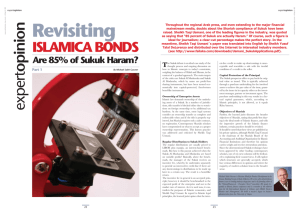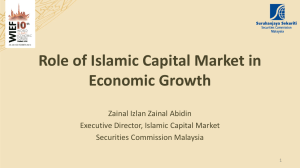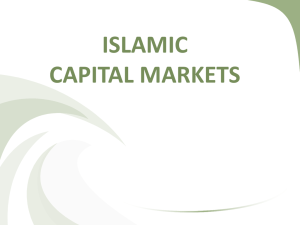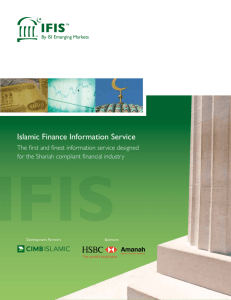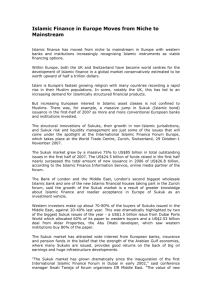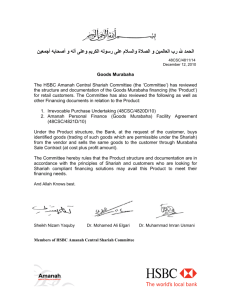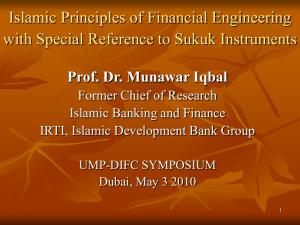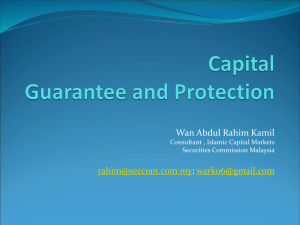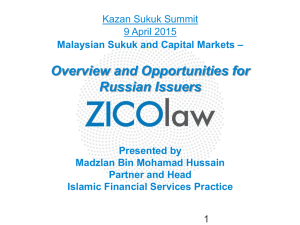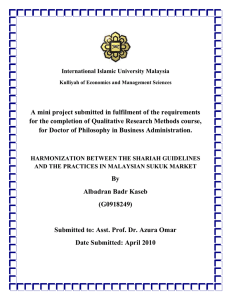Shariah Compliant Securitisation Presentation to Derivatives and
advertisement
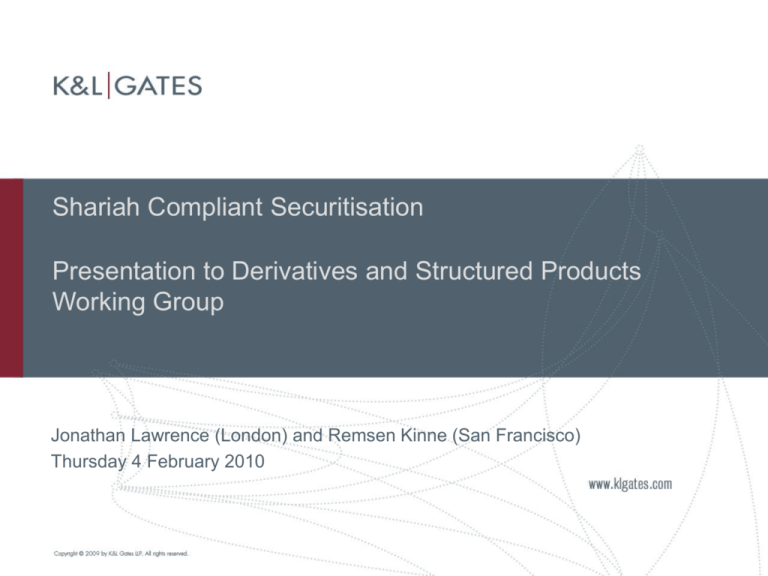
Shariah Compliant Securitisation Presentation to Derivatives and Structured Products Working Group Jonathan Lawrence (London) and Remsen Kinne (San Francisco) Thursday 4 February 2010 What is Shariah? “O you who believe! Stand out firmly for Allah, as witness to fair dealing, and let not the hatred of others to you make you swerve towards inequality and depart from justice.” Qur’an 5:8 In the business context, Shariah is a means of conducting business through a distinct set of rules designed to facilitate fairness. High correlation between Shariah compliant investing and socially responsible investing 2 Where are Shariah rules codified? Interpretations of the Qur’an from various Islamic schools of thought Accounting and Auditing Organization for Islamic Financial Institutions (AAOIFI) The fact remains: Shariah mandates are not always consistently applied from Scholar to Scholar. Information is asymmetric, and Shariah Advisers and lawyers skilled in the area become useful to work through the counter-intuitive results 3 Shariah terms Halal – that which is permitted or compliant Haram – that which is not permitted Riba – charging of interest or unjustified increase Gharar – the taking of unreasonable risk; preventable uncertainty Maisir – betting; gambling; reliance on chance or speculation, rather than effort 4 Industry prohibitions Gambling Pork production or consumption Adult Entertainment Banking and finance Alcohol production or consumption Weapons production Tobacco production or use 5 Riba The charging of sums for borrowed money (i.e. interest) is forbidden But the pledging of Halal assets, the guarantying of obligations and the leasing of property under what we might consider a finance lease (or ijara) is permissible Murabaha is the selling of a commodity at an agreed upon mark-up, and is used in Shariah as a fixed income investment substitute. 6 Shariah Finance Themes Connection to underlying assets Commercial risk taking and sharing by all parties (including financier) Entrepreneurship Returns linked to actual investment outcomes Sharing profit and loss Specific credit particpation in identified business risks Satisfaction of commercial and Islamic law 7 Islamic securitisation Transforms bilateral risk sharing between borrowers and lenders into market-based refinancing of one or more underlying Islamic finance transactions Scholar verification process: (i) type of assets; and (ii) transaction structure including credit enhancement and ownership conveyance 8 Conditions Real purpose behind fund raising; type of asset identified and not consumable Investor pay-off from profitable ventures only Collateral assets must not be debt, cash or haram No interest generation Investors hold unconditional, unsecured payment obligation (no guaranteed promissory note) Ownership element 9 Conditions (continued) Investor contribution proceeds not invested in short term cash instruments or interest bearing debt Underlying assets not used for speculative purposes and low turnover Takaful insurance Credit enhancement and/or liquidity support in permissible form 10 Sukuk Most popular ABS structure within Islamic finance, legitimised in February 1988 Financial instruments / trust certificates representing undivided ownership share in underlying asset or interest held by issuer Most sponsored by sovereign and quasi-sovereign issuers in Islamic countries Right to share in profits and asset realisations Bought and sold in secondary market and used in conjunction with other structures 11 Sukuk al Ijara CERTIFICATE HOLDERS Issue proceeds Return Sells assets SELLER Issues Sukuk Leases assets SPV ISSUER Purchase price (issue proceeds) LESSEE Rent 12 Sukuk al Musharaka CERTIFICATE HOLDERS Issue proceeds Return Issues Sukuk ORIGINATOR SPV ISSUER Cash contribution Share in profits and losses Share in profit and losses Contribution in kind (at least 30%) VENTURE 13 Credit enhancement Permitted, providing underlying assets not recharacterised Types: First-loss accounts Non-interest bearing liquidity facilities Over-collateralisation Tranching 14 Rating Criteria and Risk Same criteria as conventional product Lack of same historical data Concerns over legal regimes / lack of rules in jurisdictions in which underlying assets located Thinner secondary trading market Regulatory risk on failure of Shariah compliance 15 Challenges Limited enabling legislation Restrictions on foreign ownership of assets and enterprises Limited enabling infrastructure e.g. SPVs, trusts Reference assets meeting Shariah criteria Historically no strong funding / balance sheet rationale 16 East Cameron Gas Sukuk case East Cameron Partners (“Originator”) Musharaka sukuk July 2006 Fund Originator’s purchase of lender’s net profits interest in and further development of Louisiana offshore natural gas properties 17 Issuer: Amount: Expected return: Maturity: Rating: Distribution: Listing: Governing law: East Cameron Gas Co.(Cayman) $165.67 million 11.25% 13 years CCC+ Regulation S/Regulation D N/A U.S./Louisiana 18 Securitized asset: Right to oil and gas overriding royalty interest (“ORRI”) Repayment: From proceeds of Originator’s sales to offtakers (quarterly) Offtake split: ~11% Originator/~90% Purchaser (Issuer’s Louisiana SPV subsidiary) Closing reserves: ~$53 million aggregate to Issuer and Originator reserve accounts 19 True sale of ORRI (RE under Louisiana law) to Purchaser by Originator Over-collateral/projected pre-maturity full payout from ORRI funding to Purchaser Gas offtake contract price collar Sukuk secured by assets of Issuer (ORRI and secured accounts) 20 Key Shariah compliance features Lawful underlying asset – oil and gas Acquisition of physical asset by Purchaser -- RE Risk sharing -- through Issuer/Purchaser funding agreement True commercial value of collar – customary, wellestablished pricing mechanisms Fatwa by Shariah advisors 21 Reserve shortfall enforcement event (rating downgrade to CC) Originator filed Chapter 11 October 2008 U.S. Bankruptcy Court W. D. Louisiana True sale ruling DIP financing by Sukuk investors 22 GE Capital Sukuk case Sukuk Aircraft Leasing, Inc. (“Servicing Agent”) Ijara sukuk variation December 2009 Fund purchase price for Issuer’s purchase of portfolios of aircraft leases and beneficial ownership interests in leased aircraft from LLCs wholly-owned by Servicing Agent (“Originators”) Servicing Agent is wholly-owned by General Electric Capital Corporation (“GE Capital”) 23 Issuer: Amount: Return: Maturity: Rating: Distribution: Listing: GE Capital Sukuk Ltd (Bermuda) $500 million 3.875% 5 years AARegulation S LSE, NASDAQ Dubai, Bursa Malaysia Governing law: England and Wales (except Guarantee governed by New York law) 24 Securitized asset: Aircraft leases and beneficial ownership interests in leased aircraft Repayment 1: From Sharia compliant lease payments (semi-annually to maturity) Repayment 2: Proceeds of Originators’ repurchase of aircraft and leases (at maturity) Closing reserves: $50 million to Issuer reserve account for maturity/early termination 25 GE Capital unsecured Guarantee Insurance undertaking (Servicing Agent) Reserve accounts reverse commodity murabaha transactions (Issuer/Servicing Agent) 26 Key Shariah compliance features Strip non-compliant portion of lease payments – donate to charity No Sukuk holder interest in non-compliant insurance proceeds – Servicing Agent loss payee Risk sharing – Issuer formed as trust, Sukuk certificates evidence holders trust interests Risk sharing – unsecured payments to Sukuk holders and unsecured guarantee No Issuer rights to receive interest – judgment interest waiver Review by Shariah advisors (Citi Islamic Investment Bank, Goldman Sachs International) 27 “We intend to be regular issuers in the sukuk market and are heartened by the support we have seen in this first transaction.” quote attributed to GE senior vice president and treasurer 28 Shariah finance challenges Scholars and schools of thought Lack of standardisation / certainty Often unrated, rating agencies require government guarantees Transaction costs Asset ownership by financier involves potential liability e.g. environmental, warranty claims Insurance / takaful Tax treatment 29 Islamic securitisation Conclusion Any questions? 30 Further resources www.aaoifi.com Accounting and Auditing Organization for Islamic Financial Institutions www.islamic-finance.com www.securities.com/ifis Islamic Financial Information Services (subscription required) www.shariahcap.com Shariah Capital www.sii.org.uk/web5/infopool.nsf/html/qintifq Securities & Investment Institute: Islamic Finance Qualification 31 Disclaimer This webinar and these slides are for informational purposes only and do not contain or convey legal advice. The information herein should not be used or relied upon in regard to any particular facts or circumstances without first consulting with a lawyer. 32
